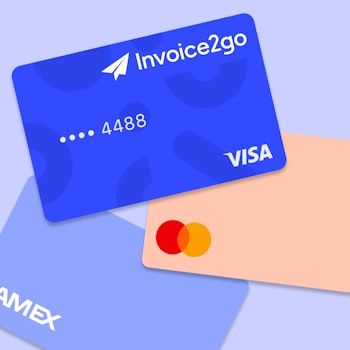The top 5 small business lessons we learned in 2021
If there’s one thing about the pandemic that we can all agree on, it’s that we’ve learned a lot. Though the lessons came about in ways that weren’t ideal, they showed us how resilient and innovative we could be in the face of adversity. We’ve learned about ourselves, our businesses, our customers, and above all, we learned to roll with the punches. We’re tough, committed, and we’re still standing.
So, here’s to small business owners everywhere! Your capacity to learn, adapt, and thrive is legendary, even when the chips are down. And what are the biggest lessons we learned in 2021? You can’t argue, there was plenty of wisdom to go around, but to keep it concise, we narrowed it down to our top five.
Top 5 small business lessons of 2021
As we look ahead to 2022 and what it may bring, the lessons we learned can be applied again and again to help us adapt and keep our business strong—even in uncertain times.
1. New ideas have huge benefits
Let’s face it—pandemic or not, work was due for a shake-up. Big companies were already pursuing remote work, distributed workforces, and working with freelancers.
The approach made sense for the bottom line, making employees happier. If there were jobs that could be done from home, it improved productivity in many cases. No commute, better work-life balance, and the reduced cost of doing business had a lot of companies thinking, “why didn’t we do this sooner?”
And it gets better. Now that most people, businesses, and customers are used to virtual solutions like Zoom, Google Meet, and Microsoft online meetings, it opened up a whole new world of possibilities for small businesses everywhere.
Even companies that had traditionally operated on a face-to-face basis found that by going virtual, they could reduce costs, streamline service delivery, and delight customers in ways they never could before.
Here are a few examples:
- Retail stores created subscription boxes and worked with third-party logistics companies to improve their returns.
- Insurance companies, contractors, and interior designers started doing virtual inspections.
- Eyeglass companies developed virtual try-on apps and step-by-step guides to encourage customers to buy online.
- Hotels implemented virtual check-ins.
- Restaurants and bakeries put their menus online and invited customers to access them using QR codes. Some even implemented self-ordering or pre-ordering systems to reduce the burden on their staff.
- Gyms and fitness trainers helped their clients stay healthy through online classes.
There are plenty more examples to pull from, but you get the idea. These are creative solutions innovated by traditionally high-touch industries.
Going virtual was a way to ensure customers experienced no gaps in their routines, to maintain a semblance of normalcy when things were anything but normal. Much more than the technology itself was the fact that these businesses shifted to a customer-centric mindset, and when they did, those customers repaid them with loyalty.
2. Small businesses take a cue from big business systems and processes
Big corporations tend to have all their ducks in a row. They hire people to handle specific tasks, and leaders surround themselves with expertise, so they always benefit from great advice.
But if you’re a small business owner, you’re likely doing it all yourself. Plus, with the current labor shortage, hiring staff to get you through crunch times and seasonal surge isn’t nearly as easy as it used to be. However, if you apply a big business mindset, adopt some of their solutions, and think like a CEO, you’ll find yourself ahead of the curve—instead of behind the eight-ball.
The world’s top brands and corporations are where they are for a reason. They are constantly looking for ways to improve. They anticipate their customer’s needs and know their market and the competition. They’re always one step ahead of the game because they never stop looking for ways to do what they do better.
How does this apply to you, a small business owner?
Many small businesses used time during lockdowns to rethink their entire business model. They got granular about the products and services they offered. They listened to their customers and found ways to improve service delivery, reduce costs, and improve efficiency.
Here’s how you can do it too:
· Revisit (or create) your business plan. If you launched your business quickly during the pandemic, chances are, you forged ahead without a plan. Or, if your company is already reasonably well-established, it could be that your business plan is outdated. Think of your business plan as a living document instead of a snapshot. The rate at which the market changes, chances are most of your ideas and projections are out of date. Your plan should remain relevant, even in the face of monumental change.
· Set quarterly goals. Projections are essential to planning. Now, mind you, most forecasts are based on past performance, and we can’t rely on the past two years to inform what lies ahead. That said, it’s vital to have goals to shoot for, both conservative and aspirational. It’s also critical to measure your progress towards those goals so you can course-correct when necessary.
Think about your objectives and what results will indicate success. Quarterly goals are more digestible. You see results (or lack thereof) quickly instead of waiting until year-end. If a particular objective is unattainable or not delivering the results you’d like, you can fine-tune your approach and still finish the year strong.
· Automate whenever possible. Automation is no longer the realm of the enterprise. These days, third-party cloud software is accessible, affordable, and, one might say, essential for any small business. By automating repetitive processes, you’ll reduce costs, eliminate errors, make your customers happier, and reclaim valuable time, which you can then channel into higher-value activities.
Some of the business processes you can automate include bookkeeping, accounting, invoicing, customer service, customer relationship management, online sales, logistics, and marketing. Invoice2go, a Bill.com company, is an all-in-one tool you can use to automate invoicing, bill payments, payroll, and more.
ZenDesk automates your customer support so your customers can get the help they need 24/7. HubSpot helps you automate your marketing. If you sell online, connecting your online store to logistics firms like ShipBob can help you meet your customers’ “Amazon” expectations.
· Delegate when and if possible. You shouldn’t do everything yourself. If you do, it’s time to ease up on your death-grip and let someone else handle (at least) the small stuff. But even some of the more challenging tasks can be delegated to others. Graphic design, social media management, emails, blog posts, and even more complex technical work can be handed off to others while you get busy with things only you can do.
Today, you have an almost endless freelance talent pool to draw from. Freelance marketplaces like UpWork and Fiverr put incredible expertise at your fingertips. Even if all you need is some admin help for a couple of days, you can find that there as well. Hire when and as required so you can focus on what you do best.
3. Do more business online
If you haven’t yet explored the possibility of doing more business online, there’s never been a better time. If there is a way to do what you do virtually, you’ll benefit in many ways. Without the limitations of geography, you’ll reach a wider audience. Plus, you’ll be removing barriers for those who might be hesitant to attend a physical location.
Some ideas you could try include:
· Virtual consultations. Virtual consults benefit you in many ways. There is no commute involved, and you’ll be able to do more in a day because of that. Plus, you’ll know right away whether a client is a good fit for you or not. This is a particular concern for life or business coaches, contractors, and other service providers. If you can determine right away whether the client or project is worth your time (and theirs), you’ll save yourself many valuable hours each week.
· Website or online store. If you sell any goods or services and don’t yet have a website or online store, you’re missing an opportunity to grow your business, boost sales, and gain brand recognition. Today’s website builders are simple enough that just about anyone can put together a professional-looking page quickly.
· Accept digital payments. If you’re still accepting paper checks, your cash flow is probably not all it should be. It’s easy to get set up to take digital payments through payment processors like Square, Stripe, or Invoice2go. Your clients can pay immediately as soon as they receive your invoice. There’s no more waiting for checks to arrive (or not), and you’ll gain more business because it’s easy to do business with you. Today’s customers want it their way, so you need to meet them on their turf.
· Boost your online presence. When we talk about online presence, your website is just the start. You need social media pages, updated online listings, well-managed ratings and reviews, and a blog to build authority in your niche. When people engage with your website and content, it provides “social proof,” which organically helps you grow your business.
4. Keep in touch and stay top-of-mind with customers
There are many ways to stay top-of-mind with your audience, and not all of them involve paid advertising. Here are some ideas:
· Use your email list. Email is a great way to get to customers who already know what you do. Build your email list and use it to let people know about new products and services, promotions, and discounts.
· Online reviews. Online reviews matter to customers, especially those shopping around and comparing. Encourage happy customers to post reviews on Facebook, Google, Yelp, Trip Advisor, or whatever makes sense to your business model. Be sure to respond to reviews, too—especially the negative ones. Your thoughtful response and willingness to do whatever it takes to make things right go a long way to showing your commitment to excellence.
· Create killer content. Blogs are a great way to keep ideas flowing and provide value to your customers. Video content is also popular and engaging. If you’re new to video marketing, don’t be afraid to use it.
· Implement a follow-up system. Don’t let potential leads go cold! Follow up on social media engagements, content downloads, or inquiries to ensure you’re not missing any opportunities. A follow-up is even more important after the sale is closed. Drop a line to find out how they’re doing with the product or service and anything you can do to help them get more out of it.
5. Brand and storytelling matter more than ever
During the pandemic, many companies moved online. As a result, you’ve got a lot of competition, so you need to find a way to stand out. One way top brands do this is by storytelling.
Online customers have endless choices. How do they choose? Often, it comes down to an emotional connection. If you can make that connection—authentically—you’ll have access to an intensely loyal audience.
Think about your brand story. What’s your “why?” What do you care about? How do you help? Customers are more likely to choose one brand over another if they feel their values are aligned.
Be prepared (as much as possible) for the unexpected
We can’t predict the future; this much is true. However, we can be prepared for whatever happens. We offer these tips in that spirit to help you shore up the foundations of your small business so that even an unimaginable disaster won’t take you down.
Think about ways you can improve efficiency by implementing third-party apps. Hire freelancers to help you complete your projects. Give your online presence a little love and start building a content library that will keep your website visitors coming back. Improve your cash flow by using an automated invoicing and online payment system, and pay more attention to what happens after the sale, as that’s what builds loyalty.
We hope you’ve enjoyed these five small business lessons we’ve learned in 2021. What resonates with you? For more tips and insights that will make you think and help you grow, join our small business community today.
Related Articles

How to accept credit card payments on Invoice2go in 3 simple steps

Accept payments online via Apple Pay and Google Pay

Must-not-miss write-offs as you wrap up 2022 year-end finances

5 ways accepting credit and debit card payments helps your business stay resilient

4 easy ways to increase cash flow today

What is Small Business Saturday and why is it important?
The features and surprising benefits of a well-designed packing slip
